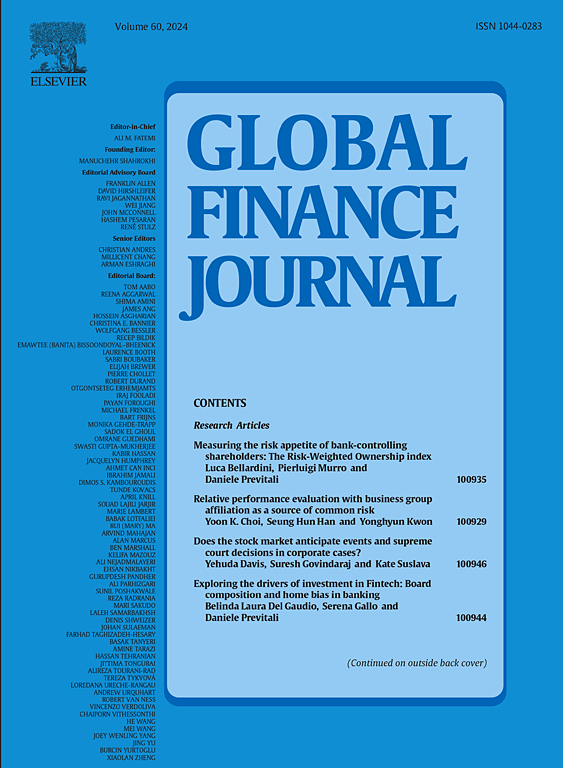超越绿色门面:洗绿与融资效率之间非线性联系的证据
IF 5.5
2区 经济学
Q1 BUSINESS, FINANCE
引用次数: 0
摘要
本文利用2009 - 2023年中国上市公司的面板数据,考察了企业漂绿与融资效率之间的非线性关系。我们在信号理论和同伴效应视角下发现了一种倒u型关系。在低层次上,“洗绿”可以让企业通过发出环境责任信号和鼓励同行模仿来获得合法性,从而提高融资效率。然而,随着“漂绿”的加剧,利益相关者的怀疑情绪也在增加,导致融资成本上升,效率下降。我们还探讨了调节这种关系的环境因素。媒体的报道放大了利益相关者对可信和夸大的环境、社会和治理(ESG)主张的反应,而董事会的连锁反应促进了“漂绿”行为的传播,并加剧了企业网络中的声誉风险。总的来说,这些因素强化了漂绿与融资效率之间的非线性联系。研究结果强调了将“漂绿”与融资条件联系起来的复杂动态,并展示了媒体知名度和治理网络在塑造市场对ESG行为的看法方面的偶然作用。本文章由计算机程序翻译,如有差异,请以英文原文为准。
Beyond the green facade: Evidence of a nonlinear link between greenwashing and financing efficiency
This study examines the nonlinear relationship between corporate greenwashing and financing efficiency using panel data from Chinese listed firms between 2009 and 2023. We identify an inverted U-shaped relationship grounded in signaling theory and the peer effect perspective. At low levels, greenwashing allows firms to gain legitimacy by signaling environmental responsibility and encouraging peer imitation, thereby improving financing efficiency. However, as greenwashing intensifies, stakeholder skepticism increases, leading to higher financing costs and reduced efficiency. We also explore contextual factors that moderate this relationship. Media coverage amplifies stakeholder reactions to both credible and exaggerated environmental, social, and governance (ESG) claims, while board interlocks facilitate the spread of greenwashing practices and heighten reputational risks within corporate networks. Collectively, these elements reinforce the nonlinear connection between greenwashing and financing efficiency. The results highlight the complex dynamics linking greenwashing with financing conditions and demonstrate the contingent roles of media visibility and governance networks in shaping market perceptions of ESG behavior.
求助全文
通过发布文献求助,成功后即可免费获取论文全文。
去求助
来源期刊

Global Finance Journal
BUSINESS, FINANCE-
CiteScore
7.30
自引率
13.50%
发文量
106
审稿时长
53 days
期刊介绍:
Global Finance Journal provides a forum for the exchange of ideas and techniques among academicians and practitioners and, thereby, advances applied research in global financial management. Global Finance Journal publishes original, creative, scholarly research that integrates theory and practice and addresses a readership in both business and academia. Articles reflecting pragmatic research are sought in areas such as financial management, investment, banking and financial services, accounting, and taxation. Global Finance Journal welcomes contributions from scholars in both the business and academic community and encourages collaborative research from this broad base worldwide.
 求助内容:
求助内容: 应助结果提醒方式:
应助结果提醒方式:


